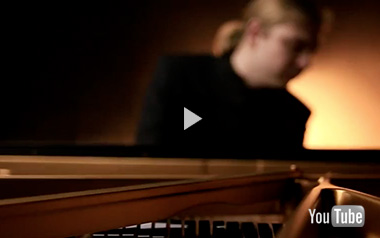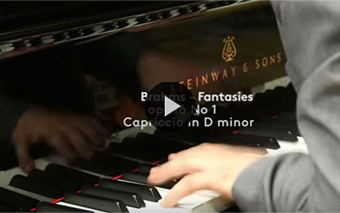Next Concerts
February 19, 2026
Odense
Odense C, Denmark
Ravel: Piano Concerto in G major, M.83
– Pierre Bleuse (conductor)
Venue: Odense Concert Hall, Odense
Mar 7, 2026
Netherlands Philharmonic / European Tour
Amsterdam, Netherlands
Brahms: Piano Concerto No.2 in B-flat major, Op.83
– Lorenzo Viotti (conductor)
Venue: The Concertgebouw, Amsterdam
REVIEWS
Feb 27 2015
A wonderfully empathetic and intelligent ‘piano whisperer’
Denis Kozhukhin proves himself here to be a wonderfully empathetic and intelligent ‘piano whisperer’. … Mere effects are not his thing, something which Kozhukhin makes clear from the very first note. His touch, his articulation – all is sensitively balanced and displays an almost crystalline precision. This is combined with an exceptionally discriminating and subtle use of pedal, which at most adds nuance to the sound colours of the Haydn sonatas’ finely woven motif progressions, but without blurring them… Denis Kozhukhin delights with his playing of Haydn where every detail is individually illuminated despite a variety of emphases and colours.
BR Klassik, February 2015
Feb 02 2015
A big night at SSO: spectacle, done with skill
“Russian pianist Denis Kozhukhin (familiar from the Symphony’s 2013 Rachmaninov Festival) was the soloist on Piano Concerto No. 3. From the spare chill elegance of the first movement’s opening to the keyboard cascades that followed, Kozhukhin had an absolute free-ranging authority.
The sway, sparkle and jeweled caprice he brought to the quieter passages were seductive. His thunder, when thunder was called for, was both potent and lush. Result: an instant and prolonged standing ovation.”
Seattle Times, Review, 30 January 2015
Dec 03 2014
Recording: Haydn Piano Sonatas (ONYX 4118)
“It’s wonderful to hear a pianist with Kozhukhin’s gifts for playing big Russian repertoire devoting himself with such incredible enjoyment… love and affection to this incredibly inventive music.”
“So poised: his sense of rhythm, his sense of space between the notes, his puckish sense of humour… the whole disc… is unalloyed pleasure.”
BBC Radio 3, CD Review, 29 November 2014
Dec 01 2014
Recording: Haydn Piano Sonatas (ONYX 4118)
“Still in his twenties, Russian pianist Denis Kozhukhin has already notched up an impressive array of awards and star appearances… On the face of it, these are rather ‘straight’ readings, meticulously fingered and judiciously paced; Kozhukhin never rushes detail or stabs at the keyboard for emphasis, nor does he resort to decorating repeats or adding brief cadenzas at fermata… Yet his apparent restraint discloses an intent thoughtfulness and a subtlety of dynamic shading through which the highly contrasted characters of Haydn’s various movements emerge all the more compellingly.
All this is evident in his fine account of the relatively familiar E flat Sonata composed in 1789 – yet even more so in the CD’s three earlier sonatas from the 1770s. The darkly rocking F minor slow movement of Sonata No. 38, as sensitively contoured by Kozhukhin, sounds like a pre-echo of the nocturnes of Field and Chopin some 60 years in the future, while his playing of the central minuet of Sonata No. 47 glows with gentle affection. We are not told the make of Kozhukhin’s modern concert grand, but it sounds lucid and even-toned in Onyx’s focused recording.”
BBC Music Magazine, February 2015
“Kozhukhin proves himself an incisive and thoughtful interpreter of Haydn. His grace, lyrical fluency and sensitivity to every aspect of these works is impressive, humour never overdone, with a lithe energy throughout.”
Classical Music Magazine, January 2015
“Denis Kozhukhin offers an absolutely remarkable version, evident from the very first notes. He highlights both the fluidity and accentuation of the discourse… Sonatas No. 38 in F major and No. 47 in B minor are some of the best known, and we are grateful to Denis Kozhukhin for having also selected Sonata No. 39 in D major. Its second movement, a delicate minor Adagio, continues directly into a final Presto which is extremely difficult to perform, with melodic fragments relentlessly passing from one hand to the other in dazzling musical fireworks before an abrupt conclusion. There are many CDs available containing similar programmes, but this one is a must-have.”
Musikzen, December 2014
“Acerbic and architecturally pointed, Kozhukhin’s playing totally mesmerizes our love of the keyboard palette [Sonata No. 47]… Kozhukhin negotiates the demanding shifts of texture and touch with seamless facility, brilliant and eminently arresting.”
Audiophile Audition, December 2014
“The four pieces, composed in the 1770s and 1780s, are given dry, sophisticated readings in which the humor in the music often sneaks in the back door of perception rather than being stated broadly. In an era in which the pianistic qualities of Haydn’s sonatas are perhaps overstressed, it’s nice to hear well-balanced readings like Kozhukhin’s here, and they fill an empty niche… The pianist’s work here is both brilliant and daring, with the “Sturm und Drang” content of the Piano Sonata in B minor, Hob. 16/32, scaled back about as far as it can go, but still holding together convincingly. An impressive and somewhat unexpected outing.”
Allmusic.com, January 2015
Nov 25 2014
Houston Symphony Orchestra / Jakub Hrůša / Prokofiev Piano Concerto No.2
“Kozhukhin is not only a genius musician, but also a brilliant performer. To watch him play is to be consumed by the music yourself in a totalizing wave. Shifts from ardent lines to chords ablaze with the disharmony that made this concerto so controversial at the beginning of the century were surprisingly fluid. Kozhukhin, rising from his bench to pull chords off the keyboard, shaking hair loose from a small pony tail, would, in an unbroken turn, become small against the piano, hunching his back as if in line with a poignant decrescendo.
In an act of magnanimity, Kozhukhin gave in to the audience’s standing ovation and calls for an encore. He chose an arrangement of Gluck’s “Dance of the Blessed Spirits” from the opera Orfeo ed Euridice. It should have been a stark change from the explosive concerto, but, profoundly, it felt like a demurely fitting resolution… To say it was breathtaking is an understatement.”
Bachtrack, October 2014
Nov 25 2014
Friends of Chamber Music, Miami / Haydn, Brahms, Liszt, Prokofiev
“Kozhukhin possesses an impeccable technique. He can play with total accuracy at extreme speeds and tricky passages seem to bring out extra dynamism in his performances. Kozhukhin matches his remarkable technical arsenal with acute musicianship and interpretive depth.
Playing the wonderful-sounding Böesendorfer in the sanctuary of Coral Gables Congregational Church, Kozhukhin opened with a hot-blooded reading of Haydn’s Sonata in D Major. The opening Allegro was invigorating, every note cleanly articulated despite the pianist’s rapid-fire pace and he astutely pointed up Haydn’s minor-key modulations. The Adagio emerged in grave tones but without a trace of heaviness, the pianist shaping the music in long arcs. There was spirit and joy in the Presto finale but also grandeur, the unexpected pauses before the final bars given appropriate weight…
Playing the melody in the left hand against the figures and filigree in the right, Kozhukhin launched the flowing song of Liszt’s Bénédiction de Dieu dans la solitide. He brought forth a wide range of dynamics, building the volume and intensity gradually and organically. A score that can sound contrived in less accomplished hands emerged moving and beautiful.”
Miami Herald, November 2014
Nov 01 2014
Mariinsky Orchestra / Valery Gergiev / Prokofiev Piano Concerto No.2 / Vienna Konzerthaus & Konzerthaus Dortmund
“Aged only 28, Denis Kozhukhin maintained a magnificent overview of the cyclopean, pianistically relentless Concerto No. 2, combining dazzling power with agility displaying differentiated sound colours – the only first-class performance of the evening.”
Die Presse, October 2014
“The endlessly long solo cadence in the Piano Concerto No. 2 Op. 16 was ludicrously good. Amidst all his virtuosity, Kozhukhin still kept the conductor in sight: Gergiev consistently retained a balancing upper hand and shaped a poetic image of Russia’s autumnal beauty.”
Wiener Zeitung, October 2014
“He condensed the richly dissonant, highly virtuosic movement of the Piano Concerto No. 2 into exciting excesses, without losing any flair for the subtle grotesque and dreamlike lyricism.”
Revierpassagen.de, November 2014


